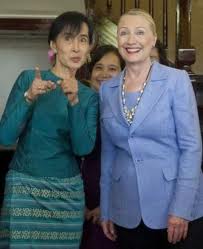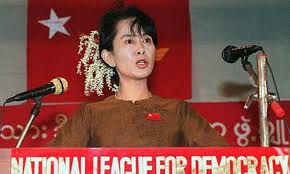Clinton in Burma: Another US move against China
By Peter Symonds , WSWS.ORG
The three-day visit by US Secretary of State Hillary Clinton to Burma (Myanmar) this week featured prominent meetings with opposition leader Aung San Suu Kyi and a great deal of hypocritical hype about American support for “democratic rights.” The real aim of Clinton’s visit, however, was to further the Obama administration’s concerted campaign to undermine the influence of China throughout Asia.
The trip—the first by a US Secretary of State for more than 50 years—was announced just two weeks ago at the East Asian Summit, where Obama intensified pressure on China over disputes in the South China Sea. Obama was determined to seize on signs that the Burmese junta was seeking an accommodation with the US to loosen the regime’s close economic and strategic ties with Beijing.
 In pointed comments before arriving in Burma, Clinton told an aid conference that developing countries should be “smart shoppers” and be wary of taking assistance from donors—like China—that were more interested “in extracting your resources, than in building your capacity.” The message was obviously addressed to Burma, among others, which is heavily dependent on Chinese economic aid and investment.
In pointed comments before arriving in Burma, Clinton told an aid conference that developing countries should be “smart shoppers” and be wary of taking assistance from donors—like China—that were more interested “in extracting your resources, than in building your capacity.” The message was obviously addressed to Burma, among others, which is heavily dependent on Chinese economic aid and investment.
Clinton explained that she had come to “test the true intentions” of the junta and would make no significant concessions by Washington. She met with Burmese President Thein Sein on Thursday in the country’s artificial new capital of Naypyidaw, warning that recent political steps, while welcome, were “just a beginning.” Over the past year, the regime has released Suu Kyi from house arrest, handed nominal power to a civilian president and permitted Suu Kyi and her opposition National League for Democracy (NLD) to run in upcoming by-elections.
The Burmese government is anxious to reach a rapprochement with Washington that would ease its heavy dependence on Beijing, end Western sanctions and allow the transformation of the country into a new cheap labour platform. Thein Sein described Clinton’s visit as “a historic milestone” that he hoped would open a “new chapter in relations.”
In comments reported in Time, presidential political adviser Nay Zin Latt pointed to some of the junta’s motivations. “Before, whether we liked it or not, we had to take what China had to offer. When sanctions are lifted, it will be better for everyone in Myanmar,” he said.
An Asia Times article entitled “China embrace too strong for Naypyidaw” traces the regime’s shifting orientation back to a power struggle that took place in 2004 when then prime minister Khin Nyunt, regarded as “China’s man” was removed on corruption charges. It pointed to Chinese anger in 2009 over the Burmese army’s treatment of Chinese nationals inside northern Burma and to a recent decision to shelve a major Chinese-funded dam project.
Despite these tensions, the Burmese regime wants to keep Beijing on side. On Monday, prior to Clinton’s arrival, the country’s top general, Min Aung Hlaing, went to Beijing to reassure top Chinese political and military leaders of the junta’s continuing collaboration. Beijing has invested considerable resources in fostering an economic and strategic relationship that provides China with raw materials and direct access to the Indian Ocean.
China has begun energy pipelines through Burma to southern China as part of Beijing’s efforts to limit its reliance on the Malacca Strait to import oil from the Middle East and Africa. The strategy is aimed at countering Pentagon plans to control key “choke points” such as the Malacca Strait and thus have the ability to impose a naval blockade on China.
Speaking on Chinese Central Television, academic Gao Zugui highlighted Beijing’s fears, saying: “The US wants to strengthen relations with lower Mekong countries like Myanmar, Cambodia and Laos. We can see this intention is strong, and it is very clearly targetting China.”
Burmese presidential adviser Nay Zin Latt also pointed to events in the Middle East as another motivation for improving relations with the US. “We do not want an Arab Spring here,” he said. The regime is concerned not only about the prospects of wide scale anti-government protests, which it has ruthlessly suppressed in the past, but also about the way in which the US exploited social unrest in Libya to intervene militarily to install a pro-American client regime.
Clinton arrived in Burma with a list of demands, including greater political freedom for the bourgeois opposition led by Suu Kyi; an ending of the protracted conflicts with the country’s ethnic minorities; and inspections of the country’s limited nuclear program by the International Atomic Energy Agency.
In return, Clinton offered very little. “We are prepared to go further if the reforms maintain momentum. But history teaches us to be cautious,” she said, adding that “we are not ready to discuss” lifting sanctions. Nor is the US proposing to establish full diplomatic relations with Burma. Clinton indicated only that the US would no longer block financing from international institutions such as the World Bank and International Monetary Fund and will support the expansion of UN development grants for health care and small businesses.
Significantly, Clinton invited Burma to join the Lower Mekong Initiative as a means of further loosening its ties to Beijing. The grouping, which includes Cambodia, Laos, Thailand and Vietnam, was created by Washington in 2009 as a means of exerting a greater regional influence. The choice of name was quite deliberate—the “lower” Mekong region by definition excluded the “upper” Mekong inside China. The US is hoping to exploit grievances over China, including the impact of Chinese dam projects on the Mekong River.
Clinton also suggested that the US and Burma collaborate in the recovering the remains of about 600 soldiers who died in the country during World War II. The proposal is similar to the joint US activities in Vietnam to locate missing American soldiers. It provides a convenient pretext for establishing direct contact between the Burmese and American military.
Clinton met twice with opposition leader Suu Kyi on Thursday and Friday in Rangoon. The Obama administration is collaborating closely with the Burmese opposition as it seeks to fashion a regime more closely aligned with American interests. Obama rang Suu Kyi from Bali two weeks ago just prior to announcing Clinton’s visit.
Suu Kyi has endorsed the US strategy in its entirety, again demonstrating that the Burmese opposition is not motivated by concerns about the democratic rights of ordinary working people. Rather Suu Kyi represents sections of the Burmese ruling elite who have been marginalised by decades of military rule and are pushing for close ties with Western powers and an opening up of the country to foreign investment.
Having boycotted the junta’s sham elections last year, Suu Kyi has now indicated that she and the NLD will stand in by-elections despite their anti-democratic character. In a video conference with the Council on Foreign Relations, Suu Kyi declared that she trusted President Thein Sein, a former general and longstanding junta apparatchik.
Suu Kyi is hoping to leverage US support to reach an arrangement with the junta that will allow the NLD to have a greater political say and give more economic opportunities to the business layers that support the opposition. Like the junta itself, Suu Kyi has expressed concern that there should be no “Arab Spring” in Burma—that is, no mass protests by the working class and rural masses.
A Wall Street Journal article entitled “Firms see Myanmar as next frontier” pointed to the benefits anticipated by major corporations from any economic opening up of the country. Business delegations are already beginning to flow into Burma keen to exploit its potential markets and rich natural resources, including gas and oil. The article noted Burma’s advantages as a cheap labour platform with “low manufacturing wages”, an intellectual class that speaks English and a legal system rooted in British common law.
While economic considerations are clearly a motivation, the primary aim of the Obama administration is to undercut China’s relations with Burma as it seeks to develop anti-China alliances throughout the region.
¶
ADVERT PRO NOBIS
________________________________________________________________________________________________________
IF YOU THINK THE LAMESTREAM MEDIA ARE A DISGRACE AND A HUGE OBSTACLE
to real change in America why haven’t you sent at least a few dollars to The Greanville Post (or a similar anti-corporate citizen’s media?). Think about it. Without educating and organizing our ranks our cause is DOA. That’s why our new citizens’ media need your support. Send your badly needed check to “TGP, P.O. Box 1028, Brewster, NY 10509-1028.” Make checks out to “P. Greanville/ TGP”. (A contribution of any amount can also be made via Paypal and MC or VISA.)
THANK YOU.
____________________________________________________________________________________________________




